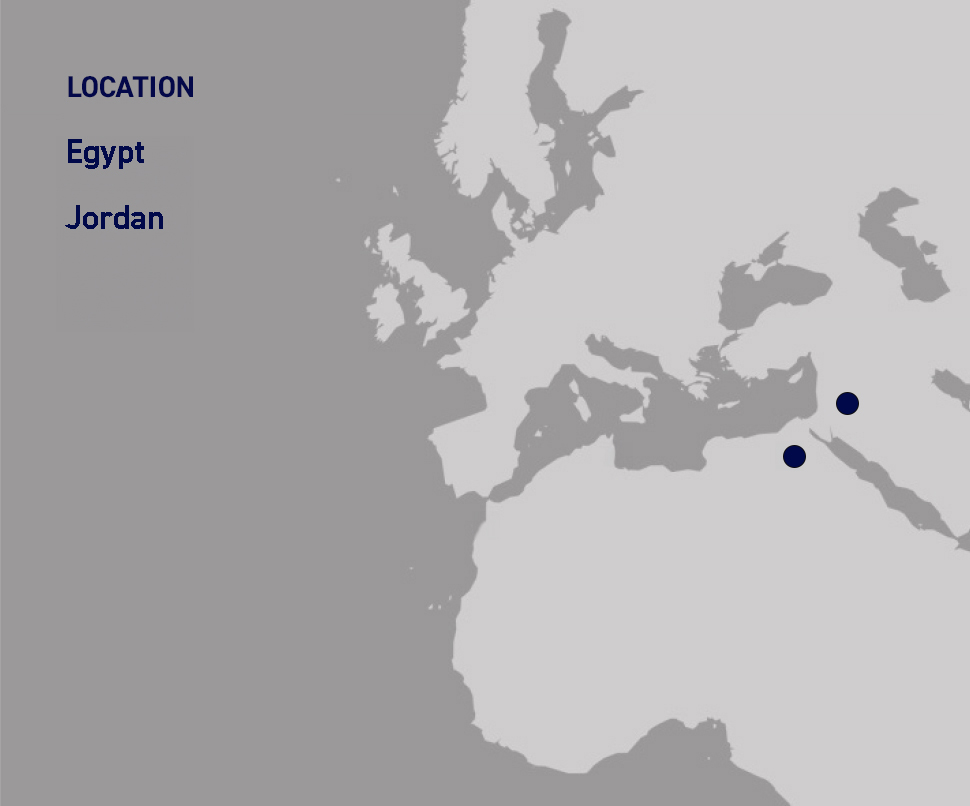
WEFE Nexus for Sustainable Development in MENA
Context and objectives
Human demand for resources continues to rise as populations and economies grow. This continuous rise in demand, under conditions of limited resources, undermines socio-economic sustainability. Additionally, the negative environmental impacts of human activities threaten the environmental sustainability of many communities and regions.
The Middle East and North Africa (MENA) region consists of young, developing nations. The population growth rate and development needs are high, putting a significant strain on the region’s already limited natural resources, particularly water.
Beyond water scarcity, population growth necessitates the expansion of social and economic infrastructure to maintain current service levels. Given the need to improve existing low service levels alongside demands from population growth, current resources and traditional service provision methods may not be sufficient or sustainable.
The need to optimise intervention outcomes at all levels – policies, plans, programmes, and projects – has become increasingly pressing. This has led to the development of the Water, Energy, Food and Ecosystem (WEFE) Nexus approach, which strives to maximise the benefits of interventions while minimising adverse environmental and ecological effects.
The WEFE Nexus can be characterised as an optimisation problem. The challenge lies in understanding the complex relationships between different sectors, which can be complementary or conflicting. Additionally, the uncertainty associated with the impacts of many actions further complicates the approach.
Empirical studies are conducted worldwide to address uncertainties arising from limited understanding of the impacts of different actions. Pilot projects are also essential for moving from theory to practice.
Location

Key figures
Duration:
24 months
Countries:
2
Total cost:
€ 1,435,035
Financial contribution
The project is 100% funded by the Swedish International Development Cooperation Agency.
Promoter
INWRDAM is a regional think and do tank, focusing on the WEFE Nexus. It engages in a wide range of activities aimed at advancing the understanding and implementation of integrated resource management. These activities include research and analysis to identify nexus-related challenges and opportunities, development of innovative technologies and practices for resource optimization, advocacy for policy reforms that support nexus approaches, capacity building through education and training programs, as well as on-the-ground projects that demonstrate the benefits of integrated resource management at local and regional scales.
Key partners
Hamsa Ordineyeh for Training and Development, a woman-led community organisation operating in the Madaba Governorate, in Jordan, with focus on improving the conditions of vulnerable population.
Beneficiaries
- The Bedouin population living in the Feiran area, Sinai, Egypt, and the individuals benefitting from the 10 hydroponic farms that will be built in Madaba and Mafraq regions in Jordan.
- Policymakers, government officials; researchers, graduate students, undergraduate students; academia; National Research Centres; national NGOs, CSOs and CBOs; international organizations and donors; educational institutions and vocational training centres.
Key actions
Improved access to reliable and up to date WEFE Nexus tools and information can be achieved by establishing a WEFE Nexus Hub as a platform for information and tools on the INWRDAM website. To ensure sustainability, the project should ensure the developed tools are institutionalized.
WEFE Nexus policy development and advocacy can be enhanced through better understanding of the policies.
The project aims to build the capacity of practitioners in the field by identifying their training needs and providing targeted trainings.
Pilot projects serve as demonstrations of how the WEFE Nexus works in practice. These pilot projects have been identified in Jordan and Egypt.
In Jordan, a cluster of ten hydroponic farms will be constructed to grow crops using harvested rain and floodwater. A solar power system (on-grid) will provide energy for the irrigation pumping systems in the farms, within the framework of the Project: WEFE Nexus for Sustainable Development in MENA.
In Egypt, the main objective is to provide local communities with a water harvesting system using a subsurface water harvesting system, including subsurface dams. A solar plant will generate electricity to power the irrigation pumping systems.
Expected Results
The project will foster the adoption and implementation of the WEFE Nexus approach among policymakers across the MENA region, not just in Egypt and Jordan. It aims to create a generation of policymakers well-versed in WEFE Nexus, its opportunities, and challenges by providing them with access to comprehensive data, reports, and policy recommendations.
The project is expected to bolster the resilience of targeted communities against food insecurity and water scarcity. It will equip them with knowledge and modern methods to improve the management of existing water resources, while also reducing adverse environmental impacts such as land erosion.
